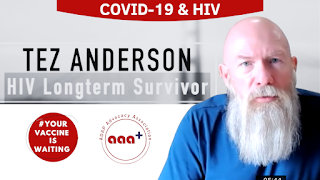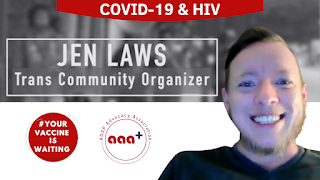By: Brandon M. Macsata, CEO, ADAP Advocacy Association
For nearly 15 years, I've had the distinct honor of serving as the CEO of the ADAP Advocacy Association. The position has afforded me the opportunity to advocate for greater access to care and treatment for people living with HIV/AIDS, as well as to encourage patients to become stronger self-advocates, and also to mentor some new advocates along the way. And although it is a rare occurrence for me, today I'm making a personal appeal to my POZ brothers and sisters to protect themselves against Covid-19. Please get vaccinated, and boosted!
Over the weekend, and only after playing the "rona-dodge-ball" game for over two years, my luck finally ran out and I tested positive for Covid-19. Last year, I had received both series of the Pfizer–BioNTech Covid-19 vaccine, as well as the first booster shot. I did so to protect myself as an immunocompromised patient, but more importantly to protect my son, Sebastian, who is too young to be vaxx'd. In retrospect, it was the best thing that I could have done for both him and me.
My ongoing recovery from Covid-19 has also been helped with a prescription for Merck's monoclonal antibody, called molnupiravir. That, and a lot of fluids and rest.
Although vaccines don't guarantee full protection against acquiring Covid-19, they most certainly do provide undeniable protection after testing positive. I have experienced 48-hours of severe Flu-like symptoms, but it could've been much worse if I had been unvaccinated.
Too many people living with HIV/AIDS remain unvaccinated, and it is concerning to me. We've witnessed enough needless suffering from this coronavirus, and far too many deaths. Please don't ignore the facts made available by the U.S. Centers for Disease Control & Prevention on the rates of Covid-19 cases, associated hospitalization, and deaths by vaccination status. The broader issue isn't about protecting you from SARS-CoV-2 infection, but rather what will happen if you do indeed get it. It is undeniable the full vaccine series and booster is very likely to keep you out of the hospital, and more importantly, out of the funeral home.
 |
| Photo Source: CDC |
My personal appeal comes in response to recent troubling conversations about vaccination hesitancy; one was with an unvaccinated young, African-American male, and another with an unvaccinated middle-aged, white female. The former believed the Covid-19 vaccinations actually cause people to get the coronavirus, and not provide any protection. The latter argued the unvaccinated were actually faring better against Covid-19 than their vaccinated (and boosted) peers. Neither of these beliefs could be further from the truth, but they exist. Unfortunately, a lot of misinformation is fueled by certain cable news outlets, social media-fueled conspiracy theories, and ill-informed politicians with bad hair lusting over sound bites.
The intersection between the HIV/AIDS epidemic and the Covid-19 pandemic has become the new normal. A recent headline in Business Insider read, "Over the last four decades, HIV/AIDS has killed at least 700,000 Americans. COVID-19 has killed more in two years." We've previously been down this road, together. So let's learn from the past!
The science and technology behind the current vaccinations against Covid-19 are deeply rooted in the same life-saving therapies we rely on to keep us all healthy...and alive! Why not embrace the Covid-19 vaccination as an extension of your HIV-related care and treatment? Why not trust in the advent of the medical and treatment advances to keep you healthy? Why not take a leap of faith the same way we'd collectively do, if a cure for HIV is eventually discovered?
There could be numerous reasons why protecting yourself against Covid-19 is important. For me, especially as a single parent, it is my son. The mental health toll that this pandemic has placed on me cannot be understated with respect to him. I lay awake at night playing the what if game. If something happens to me, then who will care for him? If I test positive, then will I expose him to this terrible illness? If he gets sick, then will he end up in the pediatric intensive care unit? What I do know, getting that jab in my arm is my best line of defense.
In other words, our choices have consequences.
If you're HIV-positive and still unvaccinated, then please... please... please protect yourself by getting vaccinated against this potentially deadly virus. Talk to your physician. Talk to your pharmacist. Talk to your social worker. Talk to your clergy. Talk to your vaccinated peers. I invite you to email me and let's set-up a time to talk about why it is so important to protect yourself and the people important to you. You're important to me, and that's why I'm making this rare appeal.
Disclaimer: Guest blogs do not necessarily reflect the views of the ADAP Advocacy Association, but rather they provide a neutral platform whereby the author serves to promote open, honest discussion about public health-related issues and updates.










